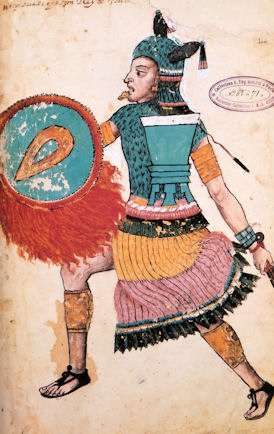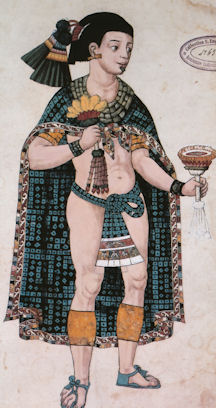
Nezahuacóyotl, King & Poet, Holding a Feathered War Shield
Codex Ixtlilxochitl
(The French Bibliotèque Nationale, like others to this day, stamped its ownership seal ostentationsly where it would diminish the aesthetics of the page.)
|
0. Introduction,
1. Quetzalcöätl,
2. Toltecs,
3. Market,
4. Flaying, 5. Lord of the Dead, 6. Poems (This Page), 7. Murder. |
Page Created: 2015-03-05 Go to site main page. Go to Aztec History. |

Background: Despite the lack of an appropriate writing system, the pre-Conquest Nahua did compose and recite poetry, which was preserved by being memorized. When the Spanish introduced writing, many pre-Conquest poems were written down (possibly inaccurately), often with the names of the poets (although some were probably misattributed). By far the most famous and often cited were Nezahualcoyotl, the king of Texcoco and his son Nezahualpilli.
Although it is difficult to appreciate the linguistic manipulations of these poems without a thorough knowledge of Nahuatl, they are striking even in English both for their control of tone and for their rather gloomy insight into the human condition.
Source:The following three poems are here reproduced from Daniel G. Brinton’s Ancient Nahuatl Poetry (Brinton’s Library of Aboriginal American Literature Number VII, 1904), which has passed into the public domain and is now available in its entirety on the Project Gutenberg web site. Brinton worked hard to assemble all of the fragments of early Nahuatl poems he could find. For each poem in the collection, he provides the original text and an English translation, as well as notes. The numbers correspond with the on-line original. I have added the introductions. (In some cases the Nahuatl text seems to have been either misspelled by original writers or mis-scanned when it was put into electronic format. No corrections have been made here.)
This wistful and poignant lamentation over the dead is attributed to a ruler (a tlahtoani), although apparently whoever added the title didn’t know which ruler, so we may be suspicious of the attribution. It can easily be read as a lamentation over the lives lost in the constant warfare in which the Nahua states were involved. Since it was written down after the Conquest, an expression like “Cause of All” should make us suspicious of Christian editing, but Brinton argues that the absence of more extensive Christian tinkering suggests that it was probably accurately transmitted from pre-Christian times.
| 1. Tlaocolxochi ixayoticaya ic nichuipana in nocuic nicuicani, niquimilnamiqui in tepilhuan, in teintoque, in tlaçotitoque in campa in ximohuaya, in oteuctico, in otlatocatico in tlallia icpac, in quetzalhuahuaciuhtoque in chalchiuhteintoque in tepilhuan, in maoc imixpan in maoc oquitlani; in ye itto in tlalticpac iximachoca in tloque in nahuaque. | 1. Weeping, I, the singer, weave my song of flowers of sadness; I call to memory the youths, the shards, the fragments, gone to the land of the dead; once noble and powerful here on earth, the youths were dried up like feathers, were split into fragments like an emerald, before the face and in the sight of those who saw them on earth, and with the knowledge of the Cause of All. |
| 2. Y yo ya hue nitlaocolcuicaya in niquimilnamiqui in tepilhuan, ma zan itla ninocuepa, ma niquimonana, ma niquinhualquixti in ompa in ximoayan, ma oc oppa tihua in tlalticpac, ma oc quimahuizoqui in tepilhuan in ticmahuizoa, azo huel yehuantin tlatlazomahuizozquia in ipalnemohualoni, quemmach tomazehual in tlazaniuh ticmatican in ticnopillahueliloque ic choca in noyollo nino tlalnamiquiliz huipana in nicuicani choquiztica tlaocoltica nitlalnamiquia. | 2. Alas! alas! I sing in grief as I recall the children. Would that I could turn back again; would that I could grasp their hands once more; would that I could call them forth from the land of the dead; would that we could bring them again on earth, that they might rejoice and we rejoice, and that they might rejoice and delight the Giver of Life; is it possible that we His servants should reject him or should be ungrateful? Thus I weep in my heart as I, the singer, review my memories, recalling things sad and grievous. |
| 3. Manozo zan nicmati in nechcaquizque intla itla yectli cuicatl niquimehuili in ompa ximohuayan, ma ic niquipapacti, ma ic niquimacotlaza inin tonez inin chichinaquiliz in tepilhuan. Cuix on machiaz? Quennel nihualnellaquahua? Aquen manian ompa niquimontocaz? Ano niquin nonotztaciz in ye yuh quin in tlalticpac. | 3. Would only that I knew they could hear me, there in the land of the dead, were I to sing some worthy song. Would that I could gladden them, that I could console the suffering and the torment of the children. How can it be learned? Whence can I draw the inspiration? They are not where I may follow them; neither can I reach them with my calling as one here on earth. |

Several poems in this collection were attributed by their sources to the famous king Nezahualcoyotl ("Fasting Coyote" or "Hungry Coyote"), who was, like his son Nezahualpilli ("Fasting [Coyote]'s Child"), one of the two most celebrated Nahuatl poets. However this is the only poem for which Brinton finds the attribution convincing.
The perspective changes from stanza to stanza. Brinton suggests, convincingly, that verses 1, 3, and 5 are intended to represent the words of the king (then a prince), while the even-numbered verses are intended to be the words of an interlocutor, presumably a courtier. In that case, line 7, referring backwards in time to Nezahualcoyotl, would have been added later, or might perhaps represent the same interlocutor, ingeniously cast forward in time.
| Totoco totoco tico, totoco totoco ic ontlantiuh tico titico ti tico tico. | Totoco, totoco, tico, totoco totoco, then it ends with tico titico, titico, tico. |
| 1. Nicaya quetza con tohuehueuh aoniquimitotia quauhtlocelo yn ca tiyayhcac in cuicaxochitl, nictemoan cuicatl ye tonequimilol ayyo. | 1. [The Prince:] I bring forth our drum that I may show the power and the grandeur in which thou standest, decked with flowers of song: I seek a song wherewith to drape thee, ah! oh! |
| 2. Ti Nopiltzi o ti Nezahualcoyotl o tiya Mictl a quenonamica y yece miyoncan ay yo. | 2. [The Courtier:] Thou, my Lord, O thou Nezahualcoyotl, thou goest to Mictlan [the land of the dead] in some manner and at a fixed time, ere long. |
| 3. Quiyon quiyon caya nichocaya ya ni Nezahualcoyotl huiya queni yeno yaz o ya nipolihuiz oya miquitla ye nimitzcahua noteouh ypalnemo o tinechnahuatia ye niaz nipolihuiz aya, yo. | 3. [The Prince:] For this, for this, I weep, I Nezahualcoyotl, inasmuch as I am to go, I am to be lost in death, I must leave thee; my God, the Giver of Life, thou commandest me, that I go forth, that I be lost, alas. |
| 4. Quenon maniz tlallin Acolihuacan huiya cuixoca quen mano o ticmomoyahuaz in momacehuali ye nimitzcahua noteouh, etc. | 4. [The Courtier:] How shall the land of Acolhuacan remain, alas? How shall we, thy servants, spread abroad its fame? I must leave thee; my God, etc. |
| 5. Can yio cuicatli tonequimilol quipoloaya a in totlacuiloli tepilhuan oo maya o huitihua nican aya ayac ichan tlalticpac oo ticyacencahuazque huelic ye xochitl ayio. | 5. [The Prince:] Even this song for thy draping may perish, which we have written for our children, it will no longer have a home here on earth when we shall wholly leave these fragrant flowers. |
| 6. O ayac quitlamitaz monecuiltonol ypalnemoa a noyolquimati cuelachic otictlanehuico Nezahualcoyotzin ay oppatihua nican anaya y chan tlpc. Oon yn ay oppatihua in tlalticpacqui, zan nicuicanitl ayaho onnichocaya niquelnamiqui Nezahualcoyotl aya ho. | 6. [The Courtier:] Alas! thy riches shall end; the Giver of Life teaches me that but for a little while do we enjoy the prince Nezahualcoyotl, nor a second time will he come to his house on earth; no second time will he rejoice on earth; but I the singer grieve, recalling to memory Nezahualcoyotl. |
| 7. Xo acico ye nican in teotl aya ypalnemoa, ayaho on nichocaya a niquelnamiqui Nezalhuacoyotl ayio. | 7. [The Commentator:] Let us seek while here the god, the Giver of Life; I grieve, recalling to memory Nezahualcoyotl. |
Although attributed to Nezahualcoyotl, and perhaps artificially made to look like the previous poem by the introduction of a line of nonsense syllables before the first line, this poem, Brinton argues, must be classified as anonymous. It is very typical of a large proportion of Nahuatl poems. (In Brinton’s words, “It will be seen that there is a wearisome sameness in the theme of most of the short poems.”) Like a great many (perhaps most) Nahuatl poems, this one celebrates the beauty of flowers (and implicitly the need to enjoy the present moment) but under the shadow of sadness that human life is short and destined to end sooner than wanted.
| Quititi, quititi, quiti tocoto, tocoti tocoto tocoti zan ic mocueptiuh. | Quititi, quititi, quiti tocoto, tocoti, tocoto, tocoti, then it is to turn back again. |
| 1. Ma xochicuicoya ma ichtoa nichuana ayyahue teyhuinti xochitl ao ya noyehcoc ye nica poyoma xahuallan timaliuhtihuitz ay yo. | 1. Let me pluck flowers, let me see them, let me gather the really intoxicating flowers; the flowers are ready, many colored, varied in hue, for our enjoyment. |
| 2. Ma xochitl oyecoc ye nican ayyahuc can tlaahuixochitla moyahuaya motzetzeloa ancazo yehuatl in nepapaxochitl ayyo. Zan commoni huchuetl ma ya netotilo. | 2. The flowers are ready here in this retired spot, this spot of fragrant flowers, many sorts of flowers are poured down and scattered about; let the drum be ready for the dance. |
| 3. Yn quetzal poyomatl ayc ihcuilihuic noyol nicuicanitl in xochitl ayan tzetzelihui ya ancuel ni cuiya ma xonahuacan ayio zan noyolitic ontlapanion cuicaxochitl nicyamoyahuaya yxoochitla. | 3. I the singer take and pour down before you from my soul the beautiful poyomatl, not to be painted, and other flowers; let us rejoice, while I alone within my soul disclose the songs of flowers, and scatter them abroad in the place of flowers. |
| 4. Cuicatl ya ninoquinilotehuaz in quemmanian xochineneliuhtiaz noyollo yehuan tepilhuan oonteteuctin in ca yio. | 4. I shall leave my songs in order that sometime I may mingle the flowers of my heart with the children and the nobles. |
| 5. Zan ye ic nichoca in quemanian zan nicaya ihtoa noxochiteyo nocuicatoca nictlalitehuaz in quemanian xochineneliuhtiaz, etc. | 5. I weep sometimes as I see that I must leave the earth and my flowers and songs, that sometime these flowers will be vain and useless. |
Proceed to:
0. Introduction,
1. Quetzalcöätl,
2. Toltecs,
3. Market,
4. Flaying,
5. Lord of the Dead,
6. Poems,
7. Murder,
8. Guadalupe
Return to top.
Background Design: Coyolxauhqui Sacrificial Stone, Templo Mayor, Mexico City